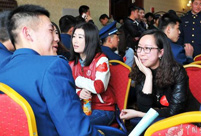 'Model husband' shatters image of love
'Model husband' shatters image of love
 Can animals smile? Or put on a happy face
Can animals smile? Or put on a happy face
 Geng Xuan crowned at 9th China Super Model Contest
Geng Xuan crowned at 9th China Super Model Contest
 Top 10 billionaires in the liquor industry
Top 10 billionaires in the liquor industry
 Backstage at China Fashion Week
Backstage at China Fashion Week
 Ballerinas anywhere but onstage
Ballerinas anywhere but onstage
 Top 10 safest airlines in the world
Top 10 safest airlines in the world
 Posters of 33rd HK Film Awards unveiled
Posters of 33rd HK Film Awards unveiled
 Top 10 most popular instant messaging apps in the world
Top 10 most popular instant messaging apps in the world
 Inspiring shadow images of Chinese army
Inspiring shadow images of Chinese army
BEIJING, April 11-- China's intransigence and a ding-dong debacle with U.S. Defense Secretary Chuck Hagel might have given the impression that his China tour was not a happy one.
What is needed is some straight talking, actually.
Anything would be an improvement on the hypocritically friendly atmosphere which currently prevents the two major powers from understanding each other's stances and limits.
When Hagel became the first foreigner to visit China's aircraft carrier Liaoning, it could have been seen as a sign of China's desire to build a workable military relationship with the United States.
Then, on Tuesday, after his meeting with Fan Changlong, vice chairman of China's Central Military Commission, Hagel was publicly scolded by Fan and informed that China is "dissatisfied" with his remarks on the Diaoyu Islands and the South China Sea.
This was quite rare in China's foreign affairs. It runs completely counter to the stereotypical Chinese attitude, conventionally one of modesty, politeness and hospitality, especially in public.
Such a change in style cannot be explained as a simple manifestation of China's tougher stance in foreign policy that has come hand-in-hand with increased political, economic and military power.
Despite the growth of its strength, China has not made any substantial changes in major principles of foreign policy. The country vociferously advocates peaceful resolution of conflicts and disputes. It is extremely rare for China to resort to force or threaten to use force.
This anomalous straight-shooting seems to have been calculated to embarrass the esteemed foreign guest. In any diplomatic ritual, hosts and guests usually interact politely, speaking in implicit code, loaded with diplomatic cliche, especially in China
There is another point of view: Fan's comments are merely a full and explicit expression of China's stance on territorial and maritime issues, a line in the sand that the United States and its Asian allies should not cross.
A full understanding of "no-go" policy areas avoids speculation and erroneous judgments which can generate outcomes that neither side wants to see.
When it comes to the relationship of China and the United States, the world's preeminent economies and powers, these interactions will redraw the world atlas and represent the future of the 21st century politics.
It is heartening that, despite many differences, the two giants are engaged in dialogue and exchanges. When Chinese President Xi Jinping met Hagel on Wednesday, the two sides agreed to build a new model of military relationship.
It is not necessary to make a fuss over some straightforward words. What China wants is to protect its core national interests. Either side needs to be vigilant against any ambiguous attitude.
 Wonderful moment of China's airborne forces
Wonderful moment of China's airborne forces Bai Baihe shoots for fashion magazine
Bai Baihe shoots for fashion magazine Red terraced fields in Dongchuan of Yunnan
Red terraced fields in Dongchuan of Yunnan Jiaju Tibetan Village
Jiaju Tibetan Village Spring dating
Spring dating Confucius institute at UC Davis
Confucius institute at UC Davis Little painted faces at temple fair
Little painted faces at temple fair Top 10 safest airlines in the world
Top 10 safest airlines in the world Foreign students at China-Myanmar border
Foreign students at China-Myanmar border The backstage of the Fashion Week
The backstage of the Fashion Week College students in Han costumes
College students in Han costumes Postgraduate works as waitress
Postgraduate works as waitress Life in a Lahu village in Yunnan
Life in a Lahu village in Yunnan An orphan’s wedding
An orphan’s wedding Hollywood documentary brings Diaoyu Islands truth to new audience
Hollywood documentary brings Diaoyu Islands truth to new audienceDay|Week|Month